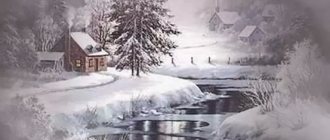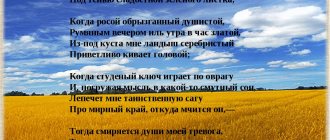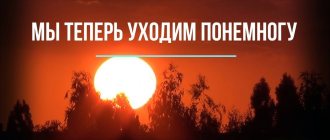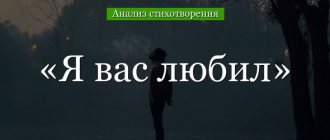Romantic poet
In the analysis of the poem “Evening” by Zhukovsky, a few words can be said about the poet’s work. Vasily Andreevich admired the poetry of German and English writers and translated the works he liked. In his poems, he tried to imitate the style of the romantic poets, but Zhukovsky did not immediately decide to publish his works.
Later, it was Vasily Andreevich who would be considered the founder of the movement of romanticism in Russia. His work in its elegance, brightness of images and beauty is not inferior to the works of poets whose work he admired. The poem “Evening” by Zhukovsky, the analysis of which is presented below, is an example of early romanticism.
Detailed analysis of the poem
Vasily Zhukovsky was an adherent of romanticism. He did not immediately begin releasing his works to readers. At first he liked to translate books by foreign authors (German and English). He imitated them and worshiped their activities. But, despite this, it is he who can be considered the founder of romanticism in Russia . The author's works are no worse than the works of foreign writers in their expressiveness, beauty and self-expression.
Zhukovsky’s poem “Evening,” the analysis of which will be useful in literature classes, symbolizes the emergence of sublime biography as a new method of reproducing the sensual “I” or a fictional hero. He passes everything around him through the prism of his own research and conveys to readers the states of his soul in a special way.
As for the history of creation, the poem was written by Zhukovsky during his stay in the village of Mishenskoye. During this period, he observed unique natural scenes that inspired him to write a romantic work.
Genre and literary direction
In the analysis of Zhukovsky’s poem “Evening,” it should immediately be noted that it is an elegy. It reflects the poet’s personal experiences, his thoughts about the harmony between man and nature, memories of the friends of his youth, and admiration for the beauty of the world around him. The beauty of the images, precisely selected metaphors and epithets - all this allows us to say that the elegy is an example of landscape lyrics written in the spirit of early romanticism.
“Evening” can also be classified as contemplative lyrics. Because the hero, standing on the bank of a stream, admires the beauty of his native banks, the evening twilight, and the sunset. The poet was in harmony with the world around him, he felt happy and found beauty in everything.
Landscape lyrics
Zhukovsky’s elegy “Evening,” published in 1806, can be called an ideal example of landscape lyricism . It is fully consistent with the spirit of emerging romanticism. In it, he sincerely admires the surrounding nature and accurately conveys its beauty in metaphors.
From the very beginning of the work, the author attracts the reader's interest. Here he acts not as a poet, but as an artist. His palette of colors has been replaced by the richest Russian language. He is able to use simple words to describe taste and even aroma, creating a complete effect of immersion in nature.
The poet is able to notice every little detail and describe it in his work. Admiring the surrounding beauty, the author makes requests to his “muse”, begging her to come to him to give him at least a few minutes of inspiration. The author’s prayers seem to have been heard. He sees a simple evening sunset in a completely different light.
The poet compares the day approaching evening with death, which destroys the bright shades of the day. But even in the evening twilight, the author notices something beautiful. The silence of the summer night, replacing the noise and din of the day, brings him extraordinary peace. At a time when “the moon’s flawed face rises from behind the hills,” this does not violate the harmony of the Universe, but only highlights it and adds new shades to the author’s poetic arsenal. Twilight is the best time for:
- thoughts;
- illusions;
- memories.
Everything around gives the author a mood to think. He remembers the comrades who were taken by the earth. He gained additional inspiration from communicating with them.
The years go by. Together with them, “all the joys of the string” and “Bacchus’ feasts with the noise of winter blizzards” go into the past, as well as the promises that friends exchanged in order to maintain friendship for centuries.
About muse and loneliness
In the elegy, the poet appeals to the muse, asking her to condescend to him. In the analysis of Zhukovsky’s poem “Evening” it should be noted that for the hero the muse is a close friend. It is she who helps him look at the world with admiration. The muse is a source of inspiration, thanks to which the poet can sing in his poems what he admires.
But the feeling of delight and peace is also mixed with sadness. In the analysis of Zhukovsky’s poem “Evening,” it is also necessary to talk about the fact that the poet indulged in sad thoughts about his friends. Vasily Andreevich regretted that there were no close people nearby who could share this wonderful evening with him. At the moment when his heart was filled with happiness and delight, he had no one to share it with. And then Zhukovsky feels his loneliness even more strongly.
But at the same time, Vasily Andreevich understands that it is perhaps the lot of a poet who sings of the beauty of the world to be lonely. But this does not sadden him: after all, his muse is with him, who guides his talent and helps to create lyrical works of amazing beauty.
Feeling lonely
Loneliness becomes Zhukovsky's constant companion. On that memorable evening, he acutely feels that no one needs him. He realizes that he must become the founder of Russian romanticism. His destiny is to admire the beauties of nature, he creates something incredible from them in his poems.
The poet does not imagine his future life and admits that the future is inevitable. He still can't change anything about him. Zhukovsky dreams of activities related to poetry. For this, he is ready to remain alone and renounce communication with friends. The author thinks that conversations with his “muse” are now more important for his self-expression.
The poet praises a calm existence without unnecessary disputes and claims. In the work, he creates a hero who perceives the beauty of the world around him in all its charms. It is this natural world, which evokes whimsical and changeable experiences and moods in the lyrical “I,” that forms the meaning of the elegy. “Evening” is characterized as an unusual type of romantic text. It has:
- memories changing one after another;
- thoughts;
- emotions.
They must present the character’s original emotional experience. The hero is especially sincere in talking about the fragility of life and losses along the path of human existence. Zhukovsky’s main task can be considered to recreate the reactions of the romantic “I” in an attractive and unique manner for readers.
Evening is the most delightful time of the day
In a brief analysis of the poem “Evening” by Zhukovsky, it is also worth explaining why the elegy describes precisely this time of day. Evening is the best time for philosophical reflection and dreams. All nature seems to have frozen, and this contemplation of the evening landscape puts you in a philosophical and romantic mood.
Despite this, the bright colors of the day seem to fade, Zhukovsky sees his charm in this. The bustle of the day gives way to peace and quiet. Even when the moon appears in the sky to replace the bright sun, it complements the beauty of the landscape. To make the elegy more aesthetically pleasing, the poet adds literary images (the houses are “towers,” he calls the plowman “orataem”). At that time, readers did not yet perceive everyday reality, so Vasily Andreevich tried to write an elegy using mythological images.
Genre of the work
The verse can be classified as an elegy-meditation. He is thoughtful and fleeting in his reflections at moments of transition into a smooth flow that absorbs the mood of what is depicted and expressed. The author's poetic one-sidedness presents an exceptional approach to the world of romantic feelings.
It can be assumed that the work marked the beginning of new poetry of the 19th-20th centuries . Zhukovsky creates a lyrical landscape in it. It is characterized by gloomy shades of the passing day and lost time. The central theme of Russian poetry is now the richness of the surrounding world (the blowing of the wind, the breeze of nature, the breath of air currents). The reference life of the environment outside of material specifics is one of the creations of the romantic Zhukovsky, anticipating the poetry of A. Blok.
A detailed analysis and summary will help students better understand the idea of the work, as well as create the right plan for literature lessons. The poem is studied in the 9th grade of school. The review makes it possible to identify the idea and analyze the composition of the poem. It is also useful for students who need to answer the teacher’s questions about a poem or write an essay on it. The work is very lively, bright and can serve as an embodiment of the era when the best Russian poems were written.
Artistic means of expression
In the analysis of the poem “Evening” by Zhukovsky, the plan is to identify the literary tropes that the poet used when writing the elegy. This work is distinguished by its elegant description of nature, which is achieved through the use of contemplative and sentimental epithets.
Adding musicality to the elegy are the techniques of sound writing, which Zhukovsky increasingly resorts to in his work - these are onomatopoeic words, alliteration and assonance. The poet, thanks to the laconicism of his phrases, made his creation easy to read and understand. Exclamatory and interrogative intonation, anaphora and appeals give melodiousness and soulfulness to the lines.
Zhukovsky’s creation “Evening” is an elegy, distinguished by the unity of the lyrical hero and an enthusiastic description of the landscape. The lines of this poem are particularly heartfelt and warm, because the poet described the real beauty of Mishensky’s native village. Vasily Andreevich was able to combine his personal experiences and emotions with the contemplation of evening nature. The elegy “Evening,” which gives a romantic description of the hero’s personality and landscape, is one of the pearls of V. A. Zhukovsky’s work.
Brief Analysis
Before reading this analysis, we recommend that you familiarize yourself with the poem Evening.
Year of writing : 1806
History of creation - written when V. A. Zhukovsky was in the village of Mishenskoye.
The theme is the purpose of man, the transience of his life, the meaning of existence.
The composition is free; the poem consists of three parts that convey a certain mood.
Genre : romantic elegy.
Composition
The composition “Evenings” is not distinguished by its complexity. There are a total of 23 stanzas of four lines each. The poem “Evening” can be divided into three parts, the first of which describes pictures of evening nature. The second part is devoted to the reflections of the lyrical hero, his memories of his past life. Here the lyrical hero turns to the muse and comes to the conclusion: “singing is my destiny,” that is, the theme of the poet and poetry is raised. The third part is a sad reflection on one’s own fate, as well as the fate of the poet in the world.





